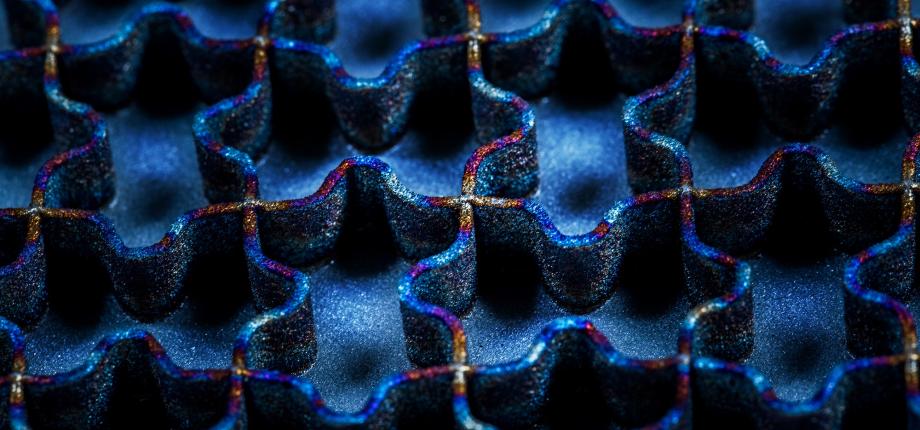At center Materials for Society, the precious alloy of science for materials

Like the other interdisciplinary centers at the Institut Polytechnique de Paris (IP Paris), the Materials for Society (M4S) center draws its roots from the crossroads of numerous scientific disciplines. “Our vocation is to bring together specialists in mechanics, physics, chemistry and biology to facilitate synergies and create knowledge around materials”, emphasizes Thierry Gacoin, Research Director at the Laboratory of Condensed Matter Physics (PMC*) and co-director of M4S. “The existence of such a center is a catalyst for collaboration. It brings out new research issues at the interface of various scientific disciplines", adds Andrei Constantinescu, Research Director at the Solid Mechanics Laboratory (LMS**) and co-director of the center along with Silke Biermann, Professor at the Ecole Polytechnique, affiliated with the Centre for Theoretical Physics (CPHT***). The aim is to meet the social and environmental challenges of our time.
Expertise and experimentation
To achieve this, M4S is already relying on major assets such as strong modeling expertise - either by using cutting-edge atomistic approaches developed by its researchers, or by optimizing processes linked to 3D printing - as well as solid skills in the field of thin-film devices. The center is on a par with similar international organizations in the USA (Berkeley, Chicago) and Scandinavia (Norway, Sweden). M4S is also home to a number of cutting-edge instrumental platforms, which it makes available to its researchers and partners. These include 3D printers that use lasers to shape metal or polymers at various scales, the latest generation of transmission electron microscopes, a platform for characterizing electronic sensors, and instruments dedicated to thin-film manufacturing.
Beyond their characterization and observation mission, these instruments open the way to experimentation and offer users the possibility of conducting in operando studies. “This has been a major trend in our field in recent years. Everyone can observe in real time the evolution of a material when it is subjected to stress or when new processes are applied to it", explains Thierry Gacoin. “These experiments are a real godsend. They give us access to extremely varied time and space scales, and plunge us right into the heart of material microstructures", adds Andrei Constantinescu. Another advantage of these platforms is that they can be adapted to the needs of researchers, thanks to the skills of high-level technical support, which opens up the field of experimental possibilities on each of the instruments.
Gateways to the business world
Building on these strengths, and on the alumni tradition of the engineering schools that make up IP Paris, bridges are naturally created between M4S and industrial circles. “We have numerous contracts with industrialists, and close partnerships have been established with major companies such as Saint-Gobain, Arkema and EDF. Our work meets some of their needs, such as the production of thin films to filter the sun's infrared rays and limit the use of air conditioners, or the study of materials for lighting and screens. Optics is very much part of our business", says Jacques Peretti, LPMC Director. Workshops are regularly organized between M4S teams and industrialists. Each team gets to know the other's needs and skills, and learns the other's language, with the aim of developing potential collaborations.
Last but not least, M4S offers IP Paris Master's students research-oriented, multidisciplinary programs1. Here, future researchers and engineers develop solid skills in a given subject while opening up to other fields. “For example, a chemist working on polymers will draw on knowledge of mechanical engineering to design high-performance molecules. It is vital that tomorrow's materials specialists are able to take into account the possibilities offered by disciplines other than their own,” conclude the three M4S directors.
About:
Silke Biermann, scientific co-director and chair of the physics departments at École polytechnique and Institut Polytechnique de Paris, professor at École polytechnique, affiliated with the Centre de physique théorique (CPHT).
Silke Biermann's work focuses on physical systems with strong electronic correlations. She is particularly interested in developing methods for describing such systems.
>> Silke Biermann on CPHT Website
Andrei Constantinescu, CNRS Research Director, Director of the École Polytechnique Solid Mechanics Laboratory.
>> Andrei Constantinescu on ResearchGate
Thierry Gacoin, materials chemist, Director of Research at the CNRS and Professor of Materials Science in the Physics and Chemistry Departments at the École polytechnique.
Thierry Gacoin is also Chairman of the Chemistry Department and Scientific Co-Director of the “Materials for Society” (M4S) interdisciplinary center at the Paris Polytechnic Institute. His research activities, carried out at the École polytechnique's Condensed Matter Physics Laboratory, focus on the synthesis and study of the optical properties of colloidal nanocrystals and nanostructured thin films. The systems studied have promising applications in biomedical diagnostic tools, quantum technologies, and functional layers for energy issues, particularly as applied to housing.
*PMC: a joint research unit CNRS, École Polytechnique, Institut Polytechnique de Paris, 91120 Palaiseau, France
**LMS: a joint research unit CNRS, École Polytechnique, Institut Polytechnique de Paris, 91120 Palaiseau, France
*** CPHT : a joint research unit CNRS, École Polytechnique, Institut Polytechnique de Paris, 91120 Palaiseau, France
1 PHD Track in Advanced Materials













